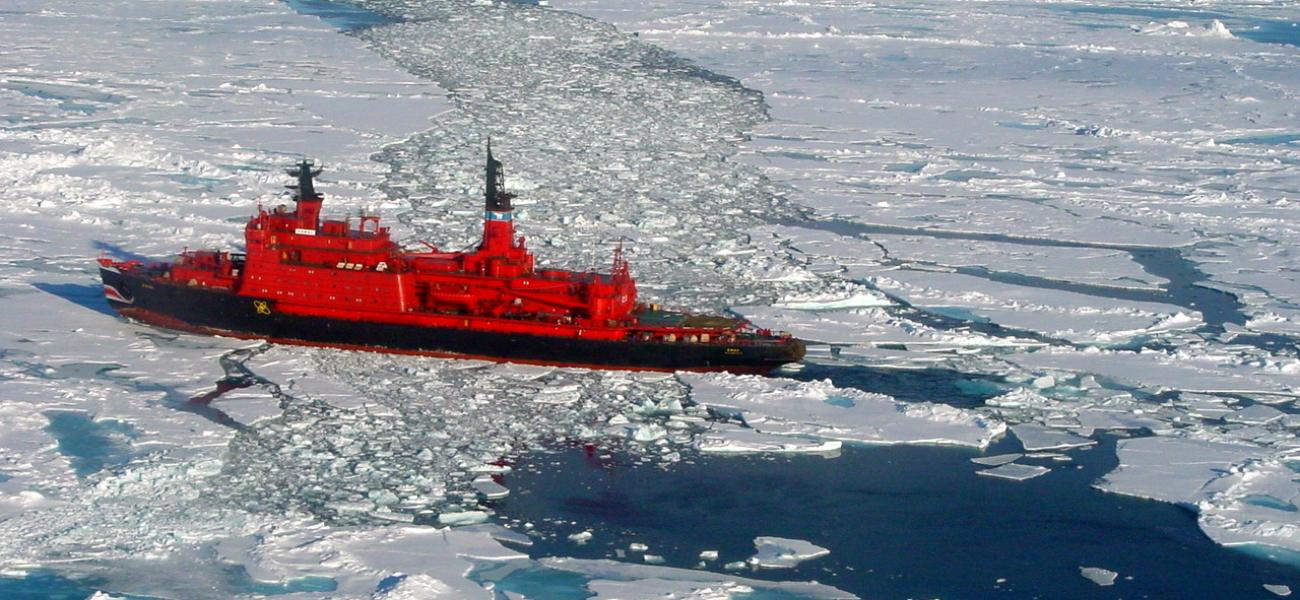
Expert Survey: How Will Climate Change Impact US-Russian Relations?
As the effects of climate change grow more intense each year, attention is shifting to the inevitable geopolitical impacts of a warming planet. In 2020, Russia experienced its warmest winter on record, while the summer saw forest fires rip through Siberia like never before. At the same time, a warming Arctic has opened up previously inaccessible shipping lanes, providing Russia with new economic opportunities. Research by experts like Marshall Burke, deputy director of the Center for Food Security and the Environment at Stanford University, and Russian climate ecologist Nadezhda Tchebakova suggests that Russia is uniquely well-positioned to capitalize on climate change. Not only will warming temperatures help Russia increase its already robust agricultural production, according to Tchebakova, but forced migration north due to climate change will also boost Russia’s population. This will allow the country to take advantage of its new position in what Burke has found to be the climate sweet spot for optimum human productivity. Others, like Prof. Alexander Kislov of Moscow State University and Roman Pukalov, director of environmental programs at the Moscow-based NGO Green Patrol, argue that Russia, warming faster than almost any other country on the planet, is facing an accelerating emergency that Russian climate activists feel Moscow has little will to confront. Far from the capital, melting permafrost releases methane gas, uncovers deadly buried pathogens and costs billions of dollars in damage to infrastructure, while catastrophic forest fires have become an annual event. Whether climate change spells a bleak or a prosperous future for Russia, its impacts will force a change in U.S.-Russian relations, necessitating “fresh thinking” from the Biden administration, notes Fiona Hill, former senior director for European and Russian affairs on the National Security Council and co-author of a book about the industrialization of Siberia.
Russia Matters has asked four leading climate experts to weigh in on the impacts of climate change on Russia and the U.S., its effect on the global balance of power and how the Biden administration’s policies toward Russia may be shaped by this shared threat. While most agreed that the costs of climate change will far outweigh any benefits Russia stands to gain, Anatol Lieven of Georgetown University in Qatar argues that the pace of climate change will determine whether or not Russia will benefit compared to other nations. Both Kislov and Carnegie’s Olivia Lazard also noted that, unlike Russia, the U.S. has the economic flexibility necessary to help it better withstand the impacts of climate change. The experts largely agreed that combating climate change is an essential interest of both the U.S. and Russia. However, while Harvard’s John Holdren notes Russia’s strong support for the Paris Agreement on climate change—to which both Russia and the U.S. are signatories—Lazard argues that Russia is one of its biggest spoilers.
Please see below for their answers to the following questions:
- What will be the positive and negative impacts for Russia and the U.S. from foreseeable climate change in the next quarter century? A recent New York Times article assumes that Russia will come out a big winner. Do you agree or not and why?
- How might climate change impact Russia’s power in the current world order, including the balance of power among the U.S., China, Russia and core EU powers?
- How could these impending changes impact the Biden administration’s policies toward Russia?
- Where will U.S. and Russian interests converge and diverge when it comes to climate change? Overall, is it in Washington’s interest to work with Moscow to address climate change? If, so what are the best ways for the U.S. to do so?

John Holdren
Teresa and John Heinz Professor of Environmental Policy, Harvard Kennedy School; Professor of Environmental Science and Policy, Department of Earth and Planetary Sciences, Harvard University; Senior Science Adviser to President Barack ObamaThe ongoing human-caused changes in global climate are not geographically uniform, and neither are their effects. For some time in some places, these changes will have benefits greater than their costs. That may well be the case for some parts of Russia, up until now. Ports on the Arctic Ocean are ice-free for longer each year, and areas not previously cultivable are becoming productive. For most places, though, it’s already the case that the opposite is true: The harm from climate change—its impacts on human health, property, economies and ecosystems—is far exceeding the benefits.
Rosy forecasts of benefits, moreover, such as those recently predicted for Russia in the New York Times, tend to be overoptimistic for a fundamental reason: They put too much weight on expected benefits of increases in average temperatures and too little weight on accompanying adverse changes in atmospheric circulation, precipitation patterns, ocean acidification, vitality of pests and pathogens and, above all, the size and frequency of weather-related extremes—most notably, for Russia, heat waves, floods, droughts and giant wildfires.
Russia is already being hit particularly hard, in this era of rapid warming, with all of the indicated extremes, as well as with growing impacts on buildings, roads and pipelines from the thawing of the permafrost on which these rest over much of Russian territory. If these problems do not already outweigh the benefits some parts of Russia are seeing from temperature increases, they will surely shift the balance to net costs over the decades immediately ahead if the pace of human-caused climate change cannot be greatly slowed.
Russian climate scientists understand all this, and so, I think, does Vladimir Putin. That is presumably why Russia not only joined the Paris Agreement but has continued to strongly endorse its importance, and why Russian scientists and diplomats continue to engage in international and bilateral collaborations to better understand the climate challenge and how to surmount it. In spite of our justified dismay with the Russian leadership’s actions in a number of other domains, the United States should welcome and build upon collaboration with Russia in this area of strong mutual interest. Meeting the global climate-change challenge will require, as President Obama was fond of saying, all hands on deck.

Alexander Kislov
Professor, Head of Department of Meteorology and Climatology, Moscow State UniversityAssuming that Russia will come out a big winner from climate change is overly simplistic. A more balanced assessment, as given recently in Science magazine and The Economist, suggests that rapidly melting permafrost attributed to warming temperatures is costing Russia billions of dollars a year due to infrastructure collapse. Indeed, capitalizing on climate change is not easy. Positive regional consequences of global climate change are accompanied by negative ones.
One claim is that in a cold country (like Russia), the warming should bring benefits in agriculture. However, in the most developed agricultural regions of Russia, a tendency toward aridity is predicted. And the transfer of agricultural production to more northern regions, underdeveloped and with poor soil and a small population, will require major socioeconomic changes and financial investments. A similar situation applies to another supposed gain for Russia—the development of the Northern Sea Route. Indeed, the shrinking ice in the Arctic opens up opportunities for navigation. However, tremendous effort will be required to reorient maritime freight traffic here between China (and Southeast Asia) and the United States, including creating infrastructure (from scratch) and legal supports.
Now about the destruction of permafrost: In the future, this may be a positive consequence of climate change for Russia, which has permafrost on 60 percent of its territory. But in the short term, we will face infrastructural collapse, since it is necessary to find funding to bolster buildings, bridges, overpasses, roads, etc. (Paradoxically, in the era of permafrost destruction, engineering methods are used to artificially freeze soil under buildings.)
Besides this, there are other negative consequences of warming for Russia: in the field of transport, in the growth of dangerous weather phenomena like summer heat waves and tornadoes, in the increase in the incidence of malaria, and more.
The only direct positive consequence of global warming for Russia is a decrease in heating costs (buildings, transport, etc.) as the cold season gets shorter.
Finally, in addition to climate phenomena, there is also politics. A benefit of climate change in the form, for example, of growth in export products or transport services may never fully materialize due to unfair competition, extortionate duties or direct bans/sanctions.
The U.S. also has problems with climate change: increasingly destructive hurricanes, including coastline flooding, the impact of aridity on agriculture, increased energy costs to cool buildings and more.
Combating climate change is essential for both the U.S. and Russia. The most common way is to look for a mechanism to implement the Paris Agreement, and President Joe Biden is bringing the country back on track. However, climate change is better tolerated by wealthier countries. In this regard, the United States can more easily endure its negative anomalies than Russia its positive ones.

Olivia Lazard
Visiting Scholar, Carnegie EuropeExtremes and disruptions will heighten in both countries in the form of droughts, fires and floods or hurricanes. In the U.S., we will see more tensions at the border between Texas and Mexico because of water, originating from both proximate water mismanagement and deforestation in the Amazon leading to disruption in atmospheric rivers. The U.S. is likely to suffer comparatively more than Russia across its territory and military bases across the world in the coming decades because of the pace and intensity of disruption. But it will also have more political and economic flexibility to recover from shocks and disasters, especially under the new administration. Russia will be tremendously impacted by climate change. It is warming twice as fast as the rest of the world. Pollution is reaching untenable levels, leading to pockets of civil mobilization. Droughts are becoming more common, leading to crop failures—of the type we saw just before the Arab Spring. Permafrost is thawing with several consequences: (1) Landslides are becoming more common; (2) old bacteria and viruses, such as anthrax, are being released. They don’t spread much now because of low population density, but are a dangerous hazard going forward. Both of these issues make long-term human activity unlikely in affected areas. The other thing, as the Times article highlights, is that the high north is short on infrastructure, which deters significant population settlements with intense economic activity. This may change depending on potential Chinese investments, but the reality is also that the construction of infrastructure and purposeful landscape change in Siberia would be a mistake: Landscape changes would accelerate ecological disintegration and greenhouse gas emissions.
Changes to Russia’s power in the current world order will depend on the timeline and scenario. In the long term, unless we manage to radically and systemically change economic and development pathways, we will be headed toward a collapse scenario. This is quite likely and, in it, great-power competition is a thing of the past. The planetary environment will not lend itself anymore to expansionary politics or economics. Russia may become one of the countries to which people will attempt to migrate because of a more clement habitat, but it will also be marked by unstable conditions and competition for available natural resources, primarily for water and food. Any country thinking it can durably benefit from climate change in economic terms operates under a delusional logic, seeing the planet as a gigantic market where countries and companies can upload their outputs and productions. But in a fully climate-disrupted world, the planet will come back to what it really is: a natural environment that defines the limits of human activity. In a scenario where we manage to transition away from fossil fuels in the next two decades at most, Russia will have to radically transform its economy. It will benefit from a boost in fossil revenues for another decade or so. If it does not use this period to design its own transition, its days as a power of any size will be numbered.
The balance of power, unsurprisingly, will hinge on China and the U.S. China holds a considerable advantage in the form of its supply chain model vis-à-vis rare earths. The U.S. and the EU have made themselves dependent on China for their own digital and clean transitions—something they are trying to rectify today with great difficulty. The U.S. is leading on key clean innovations such as electric mobility, but will need to balance its reliance on technological innovation as a way out of the climate crisis with a lot more investment into socioeconomic and democratic resilience at home if it is to maintain a durable and legitimate geopolitical model.
With the new Biden administration, the climate transition is a cross-agency priority. Russia is one of the biggest spoilers of the Paris Climate Agreement and climate action more generally (despite official claims to the contrary). It is the fourth biggest greenhouse-gas emitter, yet justifies this to maintain its revenues from fossil fuel extraction. Since Biden will want to double down on global climate efforts, it is reasonable to expect that Russia will be one of the countries that receives a lot of American attention. This can go one of two ways: Either climate will become one more topic of profound discord and tension between the two or the U.S. will manage to approach Moscow with propositions that support an economic future for Russia, and the climate issue will then become an area of proactive cooperation. If it does, then the U.S and Russia will become the two most influential actors to keep the Arctic safe from extractive exploration and conflict. This is a prospect worth striving toward.
The U.S. and Russia will diverge on: the strategic use of liquified natural gas and the Nord Stream 2 project; the moratorium on fossil exploration and exploration in the Arctic; and more generally on doubling down on Paris ambitions. With the latter, particularly, Russia will frame any push from the Biden administration as a way to hamper growth and rig geopolitical competition. This will heighten tensions. Yet a Biden push to ramp up ambitions is exactly what’s needed from a climate-action perspective. The key will be to ensure that Russia can identify its own transition path. On this, it will be necessary for the Biden administration together with the EU to support Russia. Pushing only measures that restrict Moscow’s economic and political prospects for the future, rather than incentivize action, should be avoided because it could:
- Create a counter-reaction that makes Russia less prone to climate action for reasons that are primarily about geopolitical and economic competition;
- Push Russia further into a strategic alliance and dependence relationship with China.
It is not clear how to cooperate with Russia. The U.S. could start by proposing cooperation on scientific research in the Arctic and build up to more strategic types of cooperative action, such as joint planning to transition away from LNG and joint research on energy innovation. This would be bold, but bold is exactly what is needed at the moment both in terms of climate action and in terms of mistrust de-escalation.

Anatol Lieven
Professor, Georgetown University Qatar; Senior Fellow, New America Foundation; Author of "Climate Change and the Nation State: The Case for Nationalism in a Warming World"Whether Russia will benefit on balance from climate change—at least relative to other countries—depends entirely on the speed and extent of the changes. If they are fairly limited and slow, then Russia does indeed have great advantages compared to other states.
As with Canada, a warming climate may allow the large-scale expansion of agriculture northward. If fresh water becomes an increasingly rare and precious commodity, Russia’s immense reserves may become very profitable. Moreover, compared to all other major states, far fewer of Russia’s cities are situated in coastal areas vulnerable to a rise in sea levels. Even St. Petersburg may be saveable through new flood defenses.
In fact, in the short to medium term, the greatest threat to Russia’s economy and the stability of its political system is not climate change but action against climate change: the likelihood of a steep reduction in world demand for oil, drastically reducing the value of Russia’s energy exports and badly damaging state revenues. Russians can however comfort themselves with the fact that the use of natural gas is likely to continue for considerably longer than oil, both because gas contributes less to the greenhouse effect and because abandoning gas will be even more difficult.
If, however, climate change reaches catastrophic levels over a relatively short space of time—for example, as a result of huge releases of methane from the melting Arctic permafrost—then Russia too is likely to be overwhelmed. Agriculture will not be able to adapt with sufficient speed, the world economy as a whole will collapse taking Russia’s with it and, above all, Russia—with its small population and long land borders with Asia—will be exposed to colossal waves of migration from collapsing societies to the south, which are already under stress from water shortages and rising temperatures. Even the Russian state may not be capable of the ruthlessness required to survive in such a world.
The opinions expressed in this survey are solely those of the respondents.
Photo by Wofratz shared under a Creative Commons license.
